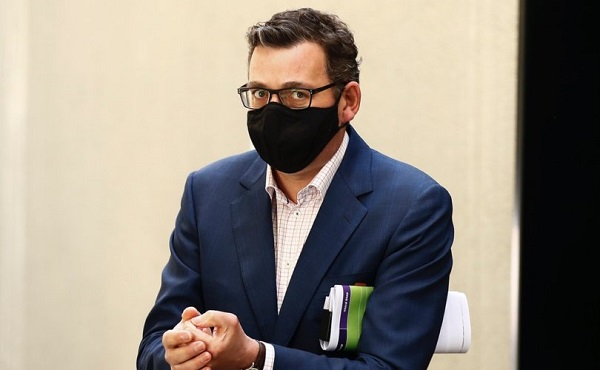Crime
Actor’s Death Raises Alarm about Off-Label Anesthetic

From Heartland Daily News
By ![]() Kevin Stone
Kevin Stone
A federal court has indicted and charged five individuals for contributing to the death of actor Matthew Perry by providing him with the anesthetic ketamine.
On October 28, 2023, Perry was found floating face-down in his hot tub. An autopsy later revealed his death had been caused by “acute effects of ketamine.” Perry, a star of the television show Friends, had long struggled with addiction.
Charged in the 18-count indictment are Perry’s personal assistant, Kenneth Iwamasa; two doctors, Salvador Plasencia and Mark Chavez; and two other individuals, Erik Fleming and Jasveen Sangha. Sangha was known as the “Ketamine Queen” who is accused of running a North Hollywood “stash house.”
Multiple Players Charged
Documents filed by prosecutors claim Perry’s assistant and an acquaintance worked with the two doctors and the drug dealer to provide tens of thousands of dollars worth of ketamine to fuel Perry’s addiction. Fleming coordinated the sale with Sangha, prosecutors say.
Iwamasa provided at least 27 ketamine injections to Perry in the five days leading up to his death, according to the prosecution. Chavez admitted selling ketamine to Plasencia for redistribution to Perry by falsifying information to a distributor and then using a prescription written in the name of a former patient.
When Plasencia texted another doctor about how much to charge Perry for the ketamine, he wrote, “I wonder how much this moron will pay,” and “Let’s find out,” prosecutors say. The trial date for Chavez and Plasencia is set for March 4, 2025.
Binge-Use Temptation
Ketamine is a dissociative anesthetic that can produce hallucinogenic effects. Ketamine is also used as a pain reliever and for the relief of treatment-resistant depression.
Some people use ketamine as a recreational drug for its ability to induce hallucinations. The effects of ketamine are short-lived, and users may rapidly develop tolerance to the drug, leading some to binge-use it.
Celebrity Power, Vulnerability
Ketamine is widely accepted as safe and effective for use as an anesthetic in a clinical setting. Off-label uses of the drug that may lead to abuse have led to rising concerns.
A recent New York Times article questioned the drug’s safety for off-label use in the wake of Perry’s death. Although ketamine ordinarily carries no more risk than other anesthetics, pain relievers, and antidepressants.
Celebrities can use their fame and wealth to circumvent effective safeguards against over-prescription and abuse, says Devon Herrick, a health economist.
“Physicians have significant leeway to prescribe FDA-approved medications off-label,” said Herrick. “Some off-label therapies later become mainstream, while others fall out of favor. What makes Matthew Perry’s situation unique was his celebrity status. Similar to the experience of Michael Jackson, Perry was able to enlist the help of physicians willing to provide him with a risky drug therapy not appropriately monitored.
“It’s unlikely a noncelebrity patient would be able to find a doctor willing to administer an anesthetic in their home,” said Herrick. “The lure of both money and bragging rights to say they’re a celebrity doctor likely culminated in Perry’s demise.”
Off-Label Benefits
Ketamine was developed as an anesthetic agent and was found to help treat some mental health conditions through off-label use, which is a common procedure, says Jeffrey Singer, a senior fellow at the Cato Institute who defends off-label use of the drug.
“Roughly 20 percent of all drugs prescribed in the U.S. are for off-label uses,” said Singer. “The [Food and Drug Administration, FDA] has always deferred to clinicians and clinical researchers on how to use drugs off-label. Once the FDA approves a drug for a particular indication, it permits clinicians to use it for any other indication where clinicians and clinical researchers believe the drug can be helpful.”
This real-world experience brings important knowledge, says Singer.
“As clinical research and clinical experience continue, such off-label drug use can lead to subsequent therapeutic advances,” said Singer. “However, clinical researchers often discover over time that specific off-label uses do not work. Over time, we should learn a lot more about what conditions ketamine works best for and what are the optimal ways to use it for those conditions.”
The system is working, says Singer.
“There is no reason why the FDA should add to the already cumbersome regulatory regime by requiring further approvals for off-label uses,” said Singer. “The FDA should leave the off-label uses of drugs to clinical researchers, clinicians, and the civil tort system.”
Black Market Problem
Adding new legal barriers to ketamine prescription would probably drive those wishing to abuse the drug into the black market, where its use would be wholly unmonitored and more dangerous drugs are also readily available, says Singer.
“People are already getting ketamine in the black market, along with other psychedelics such as MDMA, psilocybin, DMT, and magic mushrooms,” said Singer. “If the FDA further restricted online sales [of ketamine], it would only intensify profits in the black market and drive people to the black market, where the purity and strength of these drugs are less certain.
“We already have seen reports of black market MDMA—“ecstasy” or “Molly”—being laced with fentanyl,” said Singer. “Further restricting online sales of ketamine—or limiting its off-label use by licensed clinicians—will only make it more dangerous for people who continue to use ketamine. But it will not prevent them from using it.”
Kevin Stone ([email protected]) writes from Arlington, Texas.
Crime
Pam Bondi Reveals What The Holdup Is With Epstein File Release


From the Daily Caller News Foundation
By Harold Hutchison
Attorney General Pam Bondi told reporters Wednesday that the FBI is still reviewing “tens of thousands” of child porn videos that were in the possession of Jeffrey Epstein.
Epstein committed suicide while awaiting trial after he was arrested in 2019 on sex charges. Bondi was asked about the delay releasing the documents pertaining to Epstein by a reporter after announcing plans for a press conference Wednesday.
“The FBI, they’re reviewing… there are tens of thousands of videos of Epstein with children or child porn and there are hundreds of victims and no one victim will ever get released, it’s just the volume and that’s what they’re going through right now,” Bondi said. “The FBI is diligently going through that… I’ll call him later.”
Dear Readers:
As a nonprofit, we are dependent on the generosity of our readers.
Please consider making a small donation of any amount here.
Thank you!
WATCH:
Epstein, who pled guilty to sex charges in 2008, had extensive ties to celebrities, politicians and executives, even after he was a convicted sex offender. Among those who were known to have been close were L Brands founder Lex Wexner, director Woody Allen and Prince Andrew.
Microsoft co-founder Bill Gates also met with Epstein a number of times, as did employees of the Bill and Melinda Gates Foundation. Gates met with Epstein as late as 2019 despite concerns his then-wife, Melinda, expressed according to a May 2021 report by The Wall Street Journal.
The Daily Caller asked President Donald Trump about the delay in releasing the files during an April 22 White House event. “I don’t know, I’ll speak to the attorney general about that. I really don’t know,” Trump told Daily Caller White House correspondent Reagan Reese. “I know that we’ve done the RFK, the Kennedy, Martin Luther King is out there very shortly, so we’ll find out. But … we’ve really, really announced, we’re doing them in full transparency.”
Bondi released the first batch of files regarding Epstein on February 27.
Alberta
Charges laid in record cocaine seizure

From ALERT – The Alberta Law Enforcement Response Team
Five suspects have now been charged in relation to a major cocaine seizure that took place in Edmonton last year. In April 2024 $3 million worth of cocaine and other drugs was seized.
ALERT Edmonton’s organized crime team, in consultation with Alberta Crown Prosecution Service, was able to arrest and lay charges against five suspects on April 21, 2025. The charges are wide-ranging and include participation in the activities of a criminal organization, conspiracy to traffic drugs, drug trafficking, and money laundering.
“Following last year’s drug seizure, our investigative team was able to conduct a thorough investigation and identify the suspects responsible. We now have significant charges put before the courts in the hopes of holding this organized crime group accountable,” said Insp. Angela Kemp, ALERT Edmonton.
The drug seizure was initially announced by ALERT on May 6, 2024. At 27 kilograms of cocaine, it was highlighted as the largest cocaine seizure by ALERT in Edmonton.
The seizure took place on April 30, 2024 when a search warrant was executed at a west Edmonton home in the Lewis Estates neighbourhood.
ALERT alleges that the suspects are part of an organized crime group that was involved in drug trafficking in the Edmonton region, and had also supplied drugs to Grande Prairie and Saskatchewan. ALERT received assistance on the investigation by the Edmonton Police Service and RCMP Federal Policing Northwest Region.
The following suspects were charged:
- Jeffrey Vil, a 45-year-old from Edmonton, is charged with participation in activities of a criminal organization, commission of an offence for a criminal organization, conspiracy to traffic drugs, conspiracy to possess drugs for the purpose of trafficking, possession of drugs for the purpose of trafficking, laundering proceeds of crime, possession of proceeds of crime, and possession of a prohibited device.
- Tommy Szeto, a 35-year-old from Edmonton, is charged with participation in activities of a criminal organization, commission of an offence for a criminal organization, conspiracy to traffic drugs, conspiracy to possess drugs for the purpose of trafficking, possession of drugs for the purpose of trafficking, and laundering proceeds of crime.
- Tayler Fraser, a 27-year-old from Edmonton, is charged with is charged with participation in activities of a criminal organization, commission of an offence for a criminal organization, conspiracy to traffic drugs, and conspiracy to possess drugs for the purpose of trafficking.
- Christian Barwise, a 35-year-old from Edmonton, is charged with drug trafficking.
- Adrian De Guzman, a 27-year-old from Edmonton, is charged with drug trafficking.
The suspects were released from custody and are scheduled to appear in court on May 22, 2025.
Members of the public who suspect drug or gang activity in their community can call local police, or contact Crime Stoppers at 1-800-222-TIPS (8477). Crime Stoppers is always anonymous.
ALERT was established and is funded by the Alberta Government and is a compilation of the province’s most sophisticated law enforcement resources committed to tackling serious and organized crime.
-

 Business2 days ago
Business2 days agoCarney pivots from anti American campaign, embracing US and hailing Trump as “transformational president”
-

 Daily Caller2 days ago
Daily Caller2 days agoMisguided Climate Policies Create ‘Real Energy Emergency’ And Permit China To Dominate US
-

 Business2 days ago
Business2 days agoReality check—Canadians are not getting an income tax cut
-

 International1 day ago
International1 day agoIce Surprises – Arctic and Antarctic Ice Sheets Are Stabilizing and Growing
-

 Alberta2 days ago
Alberta2 days agoBonnyville RCMP targeted by suspect driving a trackhoe – Update
-

 Alberta1 day ago
Alberta1 day agoEnergy projects occupy less than three per cent of Alberta’s oil sands region, report says
-

 Health2 days ago
Health2 days agoTrump signs order to stop funding for gain-of-function research believed to have caused COVID
-

 Energy1 day ago
Energy1 day agoCarney’s energy superpower rhetoric falls flat without policy certainty







